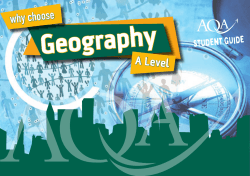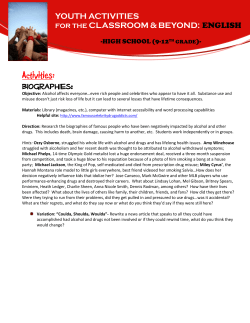
Curriculum Plan SCHOOL‐WIDE, YEAR‐LONG PLAN SCHOOL:
Completed Sample Curriculum Plan Self‐Evaluation SCHOOL‐WIDE, YEAR‐LONG PLAN SCHOOL: Emerging The school‐wide PLAN is incomplete or in unusable form. Developing Organization The PLAN is inconsistent with the submitted grade‐level maps. LOCATION: The school‐wide PLAN is in process or in draft form. Exemplary The school‐wide PLAN is typed to indicate the domains addressed by week, month, or grading period. The PLAN reflects consistency with the submitted grade‐level maps. The PLAN reflects some consistency with the submitted grade‐level maps. * Helpful: The PLAN carries a statement of what it is and how it is used; (e.g. tentative or final plan; is posted on the school web‐site for parents or is used for pacing grade‐levels MAPs, etc.) Reflection: DEVELOPING ‐ Our staff currently does not use a school-wide plan, but Team Leaders from each grade-level with the Core Knowledge Coordinator have recently consolidated the grade-level plans into a draft school-wide plan (see pages 5-8 for sample Grade-level Plans and pages 9-11 for the draft school-wide plan). ‐ Each grade-level plan is in a similar format, but each has differing amounts of detail relative to the others (e.g., Grade 1 includes topics and guidelines beyond just the domain name). All plans are typed and most contain the same components (i.e., all plans indicate the sequence of Core Knowledge domains by month, most indicate the estimated length in weeks, and on most there is a brief rationale for the placement of each domain). By consolidating these into a single document, our staff will be better able to investigate coherence and the spiraling nature of the content across the entire school. ‐ Our teachers are also in the process of creating Domain Maps for each. By using the school-wide Plan to guide our creation, we will ensure that there is consistency between the Plan and these future Maps. Some of the current grade-level plans, grade 1 for example, have a lot of detail that should be placed on the Domain Maps instead. Once this detail is organized in the Maps, the school-wide plan will be easier for all parties to use and evaluate. ©2012 Core Knowledge Foundation This sample has been created to support schools with regards to meaningful self‐evaluation and the included samples should not be used as the recommended Curriculum Plan. Please find the most recent recommended plan at www.coreknowledge.org/curriculum‐planning‐tools. Completed Sample Curriculum Plan Self‐Evaluation SCHOOL‐WIDE, YEAR‐LONG PLAN SCHOOL: Emerging The PLAN indicates less than 50% of Core Knowledge (CK) domains are addressed. The PLAN indicates most domains are not taught at the CK recommended grade level. The PLAN cites domains that are not actually domains (e.g. Science Biographies and Sayings and Phrases). Developing The PLAN indicates 50‐90% of the Core Knowledge (CK) domains are addressed. The PLAN indicates some domains are taught at the CK recommended grade level. Domains LOCATION: Exemplary The PLAN indicates 100% of Core Knowledge (CK) domains are addressed. The PLAN indicates most or all domains are taught at the CK recommended grade level. * Helpful: The PLAN has a method of showing the CK domains moved out of grade level to align to state standards. * Helpful: When domains are moved out of grade level, the PLAN has a method of showing if they are introduced at the CK level and reinforced at the tested level. * Helpful: A short description of why domains have been moved is included. Reflection: DEVELOPING ‐ The plans account for 100% of the CK domains and most are at the recommended grade (for example, Geography of the Middle East (CK Gr. 8) is moved to Grade 6 and Astronomy (CK Gr. 6) is moved to Grade 5. These domains have been added because our teachers must introduce content before students will be tested regarding these concepts (e.g., Astronomy appears in Grade 5 because Stars and Galaxies are included in the Grade 5 end-of-year assessment). ‐ The grade-level plans indicate mostly domain-based topics, but there are some non-domain exceptions such as Science Biographies and Sayings and Phrases. These non-domain topics will need to be integrated into actual domains where they logically fit. ‐ Similarly, Geography skills and Scientific Inquiry skills will need to be integrated in the context of content rather than taking up to 7 weeks to cover these units in isolation. For example, the domain An Overview of the Seven Continents (Kindergarten Science) may introduce students to the globe and maps while also introducing/assessing the names and relative positions of each continent. Integration such as this will maximize the time students have to learn content while also teaching them the necessary skills in tandem. ©2012 Core Knowledge Foundation This sample has been created to support schools with regards to meaningful self‐evaluation and the included samples should not be used as the recommended Curriculum Plan. Please find the most recent recommended plan at www.coreknowledge.org/curriculum‐planning‐tools. Completed Sample Curriculum Plan Self‐Evaluation SCHOOL‐WIDE, YEAR‐LONG PLAN SCHOOL: Emerging The PLAN indicates thematic or conceptual topics that are sequenced randomly and without regard to coherence. (Instead, they are paced based on preference, precedence, themes, seasons, or holidays). Coherence LOCATION: Developing The PLAN indicates domain‐based topics (which may be used to teach and reinforce broader concepts and processes) but the domains are sequenced randomly and without regard to coherence. (Instead, they are paced based on preference, precedence, themes, seasons, or holidays). Exemplary The PLAN indicates domain‐based topics that are sequenced logically and with consideration for coherence, particularly pre‐ and post‐requisites. * Helpful: * The plan reflects the documented use of filters for coherence: Addressing pre‐requisite knowledge and vocabulary Beginning with familiar concepts Following chronological order or geographic history Preceding events in an area with the geography of the area. Moving micro to macro or general to specific (or vice versa) Reflection: DEVELOPING ‐ Plans indicate that domain-based topics are guiding instruction rather than themes (with some exceptions such as Science Biographies discussed above). ‐ The rationale given for the placement of domains is primarily based on holidays and seasons so this will need to be modified to ensure that background knowledge and prerequisite skills are the determining factors. ‐ The Grade 1 team documented that certain science domains ‘naturally progress’ from one to the other; this is some indication that these teachers are considering how knowledge builds on knowledge, but these teachers should articulate this point further if possible. ‐ The majority of teachers, however, have sequenced the domains based on calendar dates and holidays which will not efficiently support student learning; this is especially true with regards to the history domains. For example, Grade 2 Fighting for a Cause is studied in February solely because it will coincide with Black History Month and Grade 1 Early Explorers & Settlers is studied in October/November only to coordinate with Columbus Day and Thanksgiving. This rationale does not consider what the students will need to know before they can understand the concepts being taught. ©2012 Core Knowledge Foundation This sample has been created to support schools with regards to meaningful self‐evaluation and the included samples should not be used as the recommended Curriculum Plan. Please find the most recent recommended plan at www.coreknowledge.org/curriculum‐planning‐tools. Completed Sample Curriculum Plan Self‐Evaluation SCHOOL‐WIDE, YEAR‐LONG PLAN Emerging Cumulative Nature SCHOOL: The PLAN does not reflect the cumulative nature of learning or the spiraling of domain‐based topics across grades. The PLAN indicates faulty consideration for the amount of time it would take to teach the content of each grade level without over‐ or under‐teaching it. LOCATION: Developing The PLAN reflects the cumulative nature of learning with some spiraling of domain‐ based topics across grades. The PLAN indicates an estimated amount of time to teach the content of each grade level without over‐ or under‐teaching it, although there may be some questionable areas. Exemplary The PLAN strongly reflects the cumulative nature of learning by spiraling domain – based topics across grades. The PLAN indicates an appropriate amount of time to teach the content of each grade level without over‐ or under‐ teaching it. Reflection: EMERGING ‐ This plan reflects the cumulative nature of the content, but it is difficult to assess how well our staff understands this because the school-wide plan was only just created and it has not been reviewed by all staff. In the absence of this plan, our teachers have been referencing the Core Knowledge At-A-Glance table to see how the content spirals across the grades. Our teachers have also indicated that the grade-level plans are not shared with other teams. We will work to share this school-wide plan in order to make the cumulative nature more apparent and to support the staff as they become acquainted with the CK Sequence in prior and future grade levels. ‐ There is also some faulty consideration for the amount of time necessary to teach certain topics. For example, spending four weeks on the Water cycle in second grade does not appear to consider that students will be reviewing content introduced in Kindergarten (Seasons & Weather) as well extending some content from Grade 1 (Matter – water as an example of changing states ). This entire domain is also going to be reviewed and extended in Grade 4 through the Meteorology domain and so four weeks may be unnecessary and too much depth. Other domains that will need to be investigated for appropriate depth of coverage include Canada in Grade 3 (currently 4 weeks) and World Geography in Grade 5 (currently 6 weeks). DRAFT: New in 2011‐ Items in italics and bearing an asterisk* indicate newly recommended and desirable features that assist the feedback process and honor the need to align to the new CCSS or individual state standards. ©2012 Core Knowledge Foundation This sample has been created to support schools with regards to meaningful self‐evaluation and the included samples should not be used as the recommended Curriculum Plan. Please find the most recent recommended plan at www.coreknowledge.org/curriculum‐planning‐tools. SAMPLE Grade‐level Curriculum Plans Kindergarten Plans (August‐May) MONTH August September October November December January February March April May Ongoing C.K. TOPIC The Human Body: The Five Senses (3 weeks) Seasons & Weather & The Sun (4 weeks) Explorers (1 week) Native Americans (4 weeks) Pilgrims/Early Colonial Life (2 weeks) Magnetism (1 week) Maps & Geography (2 weeks) Overview of the Continents (4 weeks) Presidents and U.S. Symbols (3 weeks) Plants/Farming (3 weeks) Taking Care of the Earth (2 weeks) Animals (4 weeks) Science Inquiry Rationale We begin the year with an ‘All About Me” unit as an introduction to each other. We observe and record weather patterns during this time of year because it is hurricane season. It is also a good time for ‘easier’ topics to be grasped at the beginning of the year. We celebrate Columbus Day during October and then we learn about the Native Americans that the Europeans met when they arrived. After learning about Native Americans, we go right into the regional people who helped the Pilgrims and compare to our lives today. Geography is assessed on state benchmark tests and student progress reports sent home after this grading period. Magnetism fits into the features of the globe. After learning about maps and globes, we learn the 7 continents’ names and locations on the map. We also learn about different cultures of the world. We conclude the continents in North America and begin study of Presidents to coincide with President’s day. We study plants and farming in the Spring when flowers are blooming and many plants are growing the most. After learning about plants and their needs, we learn about the resources of the Earth and how to take care of them. This also coincides with Earth Day. We continue our study of living things by studying animals and their needs/characteristics. Ongoing throughout the year with observations and experiments. ©2012 Core Knowledge Foundation This sample has been created to support schools with regards to meaningful self‐evaluation and the included samples should not be used as the recommended Curriculum Plan. Please find the most recent recommended plan at www.coreknowledge.org/curriculum‐planning‐tools. SAMPLE Grade‐level Curriculum Plans Grade 1 Plans (Sample of August – January) MONTH C.K. Topics Rationale August Social Studies Early Civilizations A. The Earliest People B. Crossing the Land Bridge a. Hunting to Farming b. Early towns & Cities Maya, Inca, & Aztec Civilizations A. Maya in Mexico B. Aztec in Mexico C. Inca in S. America (Peru, Chile) We begin the year with the Earliest people in order to time the study of Mexico with National Hispanic Heritage month. August Science The Human Body A. Skeletal System a. Skeleton b. Bones c. Skull B. Muscular System C. Digestive System a. Mouth b. Stomach D. Circulatory System a. Heart b. Blood E. Nervous System We begin the year learning about the human body because students are self‐ focused at the beginning of the year and can relate to the topic. September Social Studies Mexico A. Geography B. Culture a. Understand Indian and Spanish heritage b. Traditions such as fiesta and piñata c. National holidays: Sept. 16th, Independence Day We coordinate the study of Mexico with National Hispanic Heritage month which is Sept. 15‐Oct. 15. ©2012 Core Knowledge Foundation This sample has been created to support schools with regards to meaningful self‐evaluation and the included samples should not be used as the recommended Curriculum Plan. Please find the most recent recommended plan at www.coreknowledge.org/curriculum‐planning‐tools. SAMPLE Grade‐level Curriculum Plans September Science Germs, Disease, & Preventing Illness A. Taking Care of your Body a. Exercise b. Cleanliness c. Healthy Foods d. Rest B. Vaccinations This is a natural progression from the Human Body unit. October Social Studies Early Explorers A. Review of Kinder. story of Columbus B. Conquistadors a. Search for Gold & Silver b. Hernan Cortez & the Aztecs c. Francisco Pizarro & the Incas d. Diseases devastate Native American populations C. English Settlers a. The story of the Lost Colony; Sir Walter Raleigh; Virginia Dare b. VA, Jamestown, Captain John Smith, Pocahontas & Powhatan c. Slavery, Plantations in Southern Colonies d. Massachusetts, Pilgrims, Mayflower, Thanksgiving Day, Massachusetts Bay Colony, Puritans We coordinate this unit with Columbus Day and Thanksgiving. October Science Living Things and Their Environments A. Habitats; living things live in environments to which they are particularly suited B. Specific Habitats and what lives there: forest, meadow/prairie, underground, etc. Classification of Animals & Plants A. Herbivores B. Carnivores This unit correlates with our “Animal” reading unit. ©2012 Core Knowledge Foundation This sample has been created to support schools with regards to meaningful self‐evaluation and the included samples should not be used as the recommended Curriculum Plan. Please find the most recent recommended plan at www.coreknowledge.org/curriculum‐planning‐tools. SAMPLE Grade‐level Curriculum Plans C. D. E. F. November Social Studies November Science December Science & Social Studies Omnivores Extinct Animals Plants Living v. non‐living Early Explorers & Settlers continued We coordinate this unit with Columbus Day and Thanksgiving. Oceans & Undersea Life A. Most of the Earth is covered with water B. Locate the oceans: Atlantic, Pacific, Indian, Artic C. Oceans are saltwater D. Coast, Shore, waves, tides E. Currents, the Gulf Stream F. Landscape of the ocean floor: oceanic mountains, peaks, & trenches G. Diversity of ocean life; Dangers to ocean life This is a natural progression from the Habitats unit. Geography A. Name their continent, state, & community B. Maps have keys or legends with symbols and their uses C. Find directions on a map: east, west, north, south D. Identify the major oceans: Indian, Artic, Pacific, Atlantic E. Review the 7 continents F. Locate Canada, U.S., Mexico, and Central America G. Locate the equator, northern and southern hemispheres, North and South Poles H. Locate places in own state We build background knowledge here to prepare for the domain of Early Exploration of the American West and also the Earth. ©2012 Core Knowledge Foundation This sample has been created to support schools with regards to meaningful self‐evaluation and the included samples should not be used as the recommended Curriculum Plan. Please find the most recent recommended plan at www.coreknowledge.org/curriculum‐planning‐tools. SAMPLE Grade‐level Curriculum Plans January Social Studies From Colonies to Independence (3 weeks) A. Locate the original 13 colonies B. Boston Tea Party C. Paul Revere’s ride D. Etc. (see the CK Sequence) We coordinate the end of this unit with President’s Day. January Science The Earth A. Geographical Features B. Inside the Earth This unit builds on the Geography unit in December. ©2012 Core Knowledge Foundation This sample has been created to support schools with regards to meaningful self‐evaluation and the included samples should not be used as the recommended Curriculum Plan. Please find the most recent recommended plan at www.coreknowledge.org/curriculum‐planning‐tools. SAMPLE School‐wide Curriculum Plan Week Kindergarten Grade 1 Grade 2 Grade 3 Grade 4 Grade 5 Grade 6 1 The Human Body: Five Senses (3 weeks) Seasons/Weather/ Sun (4 weeks) The Human Body: Body Systems, Germs, Diseases, and Preventing Illness (7 weeks) Early World Civilizations‐Maya, Inca, Aztec, Mexico (7 weeks) Water Cycle (4 weeks) Geography of The Americas (3 weeks) American Government: The Constitution (3 weeks) Astronomy (6‐7 weeks) World Geography: Spatial Sense/Terms (6‐7 weeks) The Human Body: Circulatory and Respiratory Systems (4 weeks) World Geography: Spatial Sense and World Mountain Ranges (4 weeks) Human Body‐Cell Structure (Lymphatic and Immune Systems) (4‐6 weeks) World Geography (Spatial Sense/Deserts) (4‐6 weeks) Explorers (1 weeks) Native Americans (4 weeks) Living Things and their Environments (3 weeks) Classification of Animals & Plants (1 week) Early Explorers & Settlers (4 weeks) Magnetism (2 weeks) War of 1812 (3 weeks) Canada (4 weeks) Introduction to Classification of Animals (2 weeks) Ecology (2 weeks) Chemistry: Basic Terms and Concepts (3 weeks) Europe in the Middle Ages (4 weeks) Classifying Living Things (3 weeks) Cells: Structures and Processes (3 weeks) World Geography: Spatial Sense, Great Lakes of the World (6 weeks) Plant Structures and Processes (4 weeks) Early (Meso‐) American Civilizations (4 weeks) Pilgrims/Early Colonial Life (2 weeks) Oceans & Undersea Simple Machines (3 weeks) Life (4 weeks) Important Rivers (4 weeks) Electricity (2 weeks) August/September 2 3 4 5 6 7 October 8 9 November 10 11 12 Animals‐Life Cycles and Reproduction (4 weeks) Energy, Heat & Heat Transfer (3 weeks) Science Biographies: Marie Curie (1 Week) Ancient Civilizations (4 weeks) Astronomy (3 weeks) Newton’s Law of Gravity (1 week) ©2012 Core Knowledge Foundation This sample has been created to support schools with regards to meaningful self‐evaluation and the included samples should not be used as the recommended Curriculum Plan. Please find the most recent recommended plan at www.coreknowledge.org/curriculum‐planning‐tools. SAMPLE School‐wide Curriculum Plan Early Explorers & Settlers (cont) (4 weeks) Westward Expansion (3 weeks) Magnetism (1 week) Maps/Geography (2 weeks) Geography (3 weeks) Simple Machines (cont) Civil War (3 weeks) Vikings and Norse Mythology (3 weeks) Scientific Process/Inquiry (3 weeks) Geology: The earth and Its Changes (4 weeks) Early and Medieval African Kingdoms (2 weeks) The Human Body Systems (3 weeks) Feudal Japan (3 weeks) Plate Tectonics (3 weeks) Geography of the Middle East (cont.) (3 weeks) Overview of Continents (4 weeks) From Colonies to Independence (3 weeks) American Symbols & Figures (1 week) The Earth (4 weeks) Immigration (2 weeks) Human Body (2 weeks) Ancient Rome (4 weeks) Ecology/Plants (cont) (4 weeks) Meteorology (3 weeks) China: Dynasties and Conquerors (2 weeks) Chemistry: Matter and Change; Chemical and Physical Change (4 weeks) Native Americans: Cultures and Conflicts (4 weeks) Wegener, Newton, & Plate Tectonics (cont.) (2 weeks) Early Exploration of the American West (4 weeks) Civil Rights Leaders/Fighting for a Cause (2 weeks) Chemistry: Matter and Chemical & Physical Change (4 weeks) Oceans (cont.) (4 weeks) 13 Scientific Process/Inquiry (4 weeks) 14 December 15 16 17 18 January 19 20 February 21 22 Presidents and U.S. Symbols (3 weeks) The Earliest Americans (4 weeks) Renaissance and Europe in the Middle Ages (cont.) Reformation (4 weeks) (1 week) Spread of Islam and Holy Wars (2 weeks) Earth in Space & Time (STATE standard) (4 weeks) Ancient Civilizations (cont.) (1 week) Geography of the Middle East (3 weeks) Oceans (2 weeks) Enlightenment (2 weeks) French Revolution & Romanticism (2 weeks) ©2012 Core Knowledge Foundation This sample has been created to support schools with regards to meaningful self‐evaluation and the included samples should not be used as the recommended Curriculum Plan. Please find the most recent recommended plan at www.coreknowledge.org/curriculum‐planning‐tools. SAMPLE School‐wide Curriculum Plan Astronomy: Introduction to the Solar System (4 weeks) 23 Seasonal Cycle (2 weeks) Human Body: Vision; Light/Optics (4 weeks) The American Revolution (4 weeks) The Civil War (4weeks) Early Asian Civilizations (3 weeks) Life Cycles (2 weeks) Early American Explorers (4 weeks) Human Body: Hearing; Sound (4 weeks) Earth and Space: Resources (State Standard) (4 weeks) Early Presidents and Politics (3 weeks) Science Biographies (3 weeks) The Civil War (cont) (4 weeks) Astronomy: Stars and Galaxies (1 week) Science Biographies (cont.)‐Latimer (1 week) Latin American Independence Movements (1 week) Immigration (1 week) Industrialization & Urbanization (2 weeks) Taking Care of the Earth (2 weeks) Animals (4 weeks) Ancient Egypt (4 weeks) Introduction to Electricity (4 weeks) Ancient Greece (3 weeks) Insects (2 weeks) 13 Colonies: Before the Revolution (4 weeks) Human Body: Skeletal, Muscular, Nervous (4 weeks) Heredity and Reproduction Interdependence (STATE Standard) (4 weeks) The Human Body: Changes in Human Adolescence (4 weeks) Westward Expansion (3 weeks) Industrialization & Urbanization (cont.) Reform (2 weeks) March 29 April 32 Mesopotamia (4 weeks) Matter/Properties of Matter: Measurement (4 weeks) 28 31 Industrialism, Capitalism, & Socialism (2 weeks) Plants/Farming (3 weeks) 27 30 Latin American Independence Movements (1 week) 24‐25 26 French Revolution & Romanticism (cont.) (1 week) ©2012 Core Knowledge Foundation This sample has been created to support schools with regards to meaningful self‐evaluation and the included samples should not be used as the recommended Curriculum Plan. Please find the most recent recommended plan at www.coreknowledge.org/curriculum‐planning‐tools. SAMPLE School‐wide Curriculum Plan Making a Constitutional Government (2 weeks) 33 European Explorers (1 weeks) 34 35 May/June 36 The Practice of Science‐Scientific Inquiry (ongoing all year) Three World Religions (3 weeks) Science Biographies (3 weeks) Modern Japan (2 weeks) Insects: Social (1 week) Scientific Investigation (ongoing all year) Historical Inquiry and Analysis (ongoing all year) Colonial America (cont) (3 weeks) Human Body Systems (cont) Science Biographies (ongoing all year) Science Biographies (ongoing all year) Reformers (2 weeks) The Human Body (cont) (2 weeks) Russia: Early Growth and Expansion (3 weeks) ©2012 Core Knowledge Foundation This sample has been created to support schools with regards to meaningful self‐evaluation and the included samples should not be used as the recommended Curriculum Plan. Please find the most recent recommended plan at www.coreknowledge.org/curriculum‐planning‐tools.
© Copyright 2025












